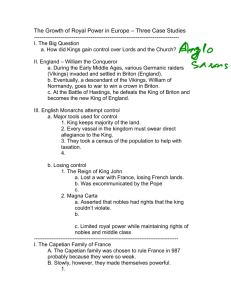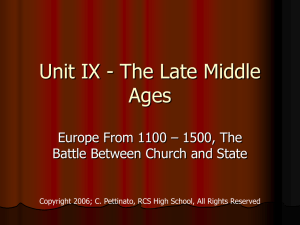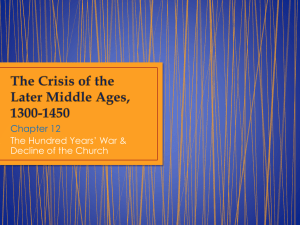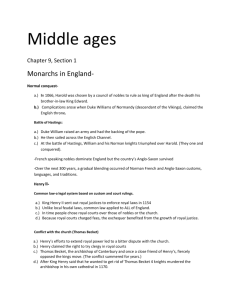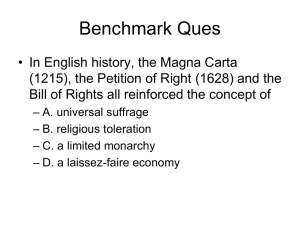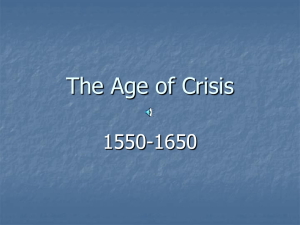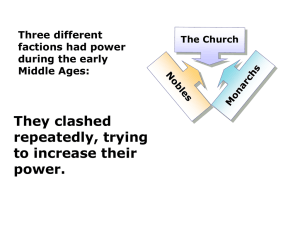developmentoffrancea..
advertisement
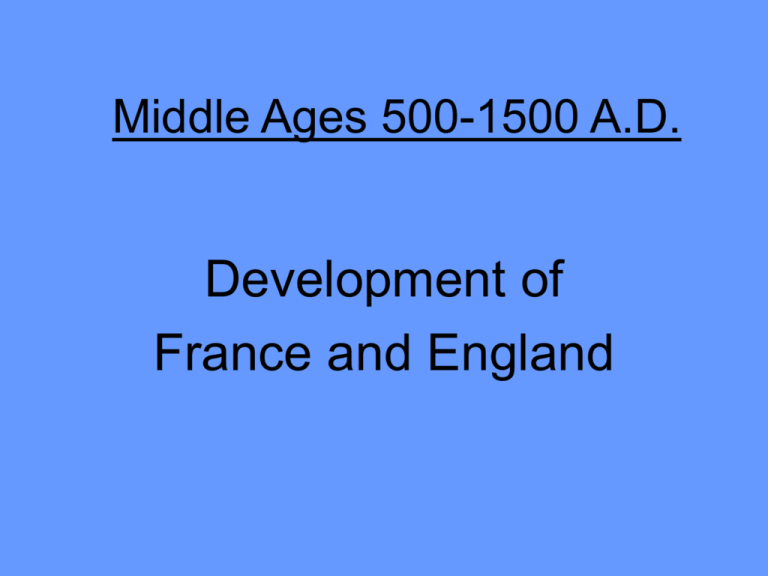
Middle Ages 500-1500 A.D. Development of France and England Development of France and England Germanic tribes – – – – – migrate across Europe push/pull factors herders and farmers different culture from Romans carve Western Europe into small kingdoms Development of France Franks: 400-700 A.D. – strongest of Germanic tribes • Clovis – conquered Gaul – united Franks in central Europe – converted to Christianity (religion of Gaul people) – supported by Pope Development of France Charles Martel – Carolingian – rallied Frankish warriors against Moors (Muslims) • Battle of Tours – 732 A.D. – Charles Martel stopped Muslim advance into Europe – Pope pleased with Carolingians (Muslims were threat to papacy) Development of France • Charlemagne – Hero of Middle Ages • (Holy Barbarian, Charles the Great) – 46 year reign – loved to battle – organized kingdom of Franks with laws – builds empire • conquests reunited much of old Roman empire – In 800, Pope Leo III asks for help with nobles rebelling in Rome • Frankish armies crush rebellion – crowned Holy Roman Emperor for helping pope • Christmas day 800 in Rome • thus was born the Holy Roman Empire Development of France • Charlemagne – wanted a united Christian Europe • worked with Church to spread Christianity – appointed powerful nobles to rule regions • gave them land (fiefs) – missi dominici • officials sent out by Charlemagne • controlled provincial rulers (nobles) – ordered one of first great migrations • made hundreds of thousands move to Russia if they didn’t want to become Christians Charlemagne Development of France • Treaty of Verdun in 843 A.D. – divided empire: Italy, Germany, France • Feudalism and manorialsim flourished – feudal warfare • Successors to Charlemagne had little power over great feudal nobles Development of France • Hugh Capet, count of Paris – nobles elect him to throne 987 A.D. – weak, no threat to powerful nobles – lands smaller than many of his vassals – he and heirs increase royal powers – play rival nobles against each other – increase royal lands – won support of Church and middle-class townspeople Development of England • Angles, Saxons, and Vikings settled in England • Feudalism developed • English rulers kept kingdom united • 1066 King Edward the Confessor dies – no heir – council of nobles chose Harold Development of England • Duke William of Normandy – claims throne – raises army – backed by pope • Battle of Hastings in 1066 – William and knights defeat King Harold – last invasion of England Battle of Hastings Development of England • William the Conqueror → King William I – crowned king of England Christmas day 1066 – French-speaking nobles dominated England – over next 300 years, gradual blending of Norman-French & Anglo-Saxon customs, languages, traditions Development of England • King William I – firm control – fiefs to Church and Norman lords – monitored who built castles and where • Domesday Book - 1086 – complete and thorough census – helped build efficient tax collecting system – no one could escape • name compared to God’s final judgment day Development of England • Henry II – 1154 inherits throne – expanded customs into law (royal law) • sent traveling justices to enforce – foundations of English Common Law • legal system based on custom and court rulings • protects property – early jury system – married Eleanor of Aquitaine Development of England and France • Eleanor of Aquitaine – first married to France’s King Louis VII – joined Second Crusade • wore armor and rode horse with other Crusaders – she ended marriage to Louis VII – married England’s King Henry II – 8 children • Richard (“the Lion-Hearted”) • John – spurred several sons to overthrow Henry II – revolt failed – 15 years in prison Eleanor of Aquitaine Development of England • Richard I – – – – – – known as “the Lion-Hearted” freed Eleanor from prison popular national hero reigned 10 years, less than 1 year in England spent reign fighting, causing debt and taxes a leader of Third Crusade • went for religious reasons • John ruled England for him – on way home, captured • held prisoner 14 months until ransomed at great cost – brother John attempted to take English throne – dies without heir Richard I (Lionheart) John I Development of England and France • John I – faced 3 powerful enemies • King Philip II of France – lost war & all of England’s land in France – English expelled from France • Pope Innocent III – battled over selection of Archbishop of Canterbury – excommunicated John and placed England under interdict • English nobles – angered by oppressive taxes & other abuses of power Development of England • John I – provoked English nobles into revolt – economic difficulties and high inflation – civil war • nobles took sides for or against John – forced to sign Magna Carta in 1215 • “Great Charter” Development of England • Magna Carta - 1215 – 1st document in English history where monarch does not have complete or absolute power • created limited monarchy – ideas still influence systems of government in many countries around world today Development of England • Magna Carta - 1215 – places King of England under law – statement of civil liberties for noblemen • protects privileges of lords • recognizes legal rights of townspeople and Church – king agrees not to raise taxes without consulting the Great Council – representative body of lords and clergy – in 1200s, evolves into Parliament 1 Evolution of English Government 1066 Norman Conquest = William of Normandy defeats Anglo-Saxons at Hastings. 1086 Domesday Book = William I uses this survey as a basis for taxation. 1160s–1180s Common Law = Henry II lays foundation for English legal system. 1215 Magna Carta = John signs this document limiting royal power and extending rights. 1295 Model Parliament = Edward I summons Parliament, which includes representatives of common people. Development of England • Parliament – developed into 2 house legislature • House of Lords – nobles and high clergy (upper house) • House of Commons – knights and middle-class citizens, or commoners (lower house) – over centuries, gained crucial “power of the purse” • right to approve new taxes • checked or limited power of monarch – many practices of U.S. Congress have roots in practices of British Parliament Development of France • Philip II – also known as Philip Augustus – defeated John I and expelled English – most powerful ruler in Europe before death in 1223 – strengthened royal government • used paid middle-class officials (more loyal) instead of nobles • quadrupled royal land holdings Development of France • Louis IX – – – – – most admired of his time generous, noble, devoted to justice & chivalry deeply religious, declared a saint led France in 2 wars against Muslims improved royal government • outlawed private wars • ended serfdom • created strong national feeling (nationalism) – established absolute monarchy (complete authority) – St. Louis named for Louis IX Louis IX – St. Louis Development of France • Philip IV – established Estates General – tried to collect new taxes from clergy • threatened to arrest those who did not pay – power struggle with Pope Boniface VIII • forbade taxation of clergy without papal consent • threatened to excommunicate clergy who paid – seized Boniface when traveling near French border • escaped, but badly beaten • humiliated and never returned to Rome • died the next year Development of France • Estates General – established by Philip IV in 1302 in attempt to tax clergy • caused Babylonian Captivity • led to Great Schism – French legislature • includes reps from all 3 estates, or classes – clergy, nobles, townspeople – did not develop same role at British Parliament • never gained power of purse • never served as balance to royal power Development of France and England • France – Absolute Monarchy • England – Limited Monarchy
